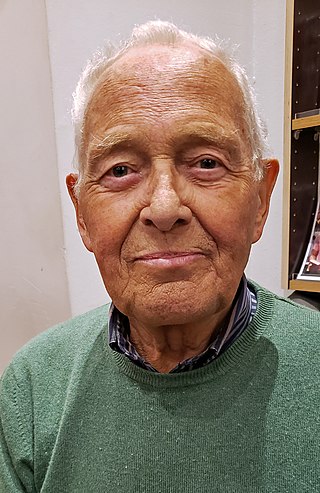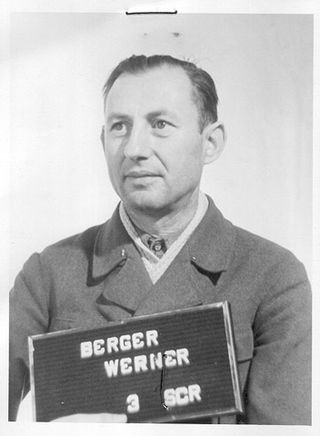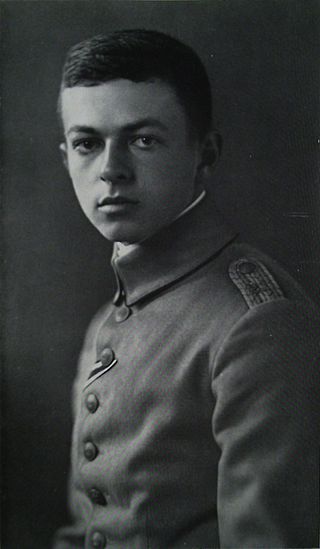
Güstrow is a town in Mecklenburg-Vorpommern in north-eastern Germany. It is capital of the Rostock district; Rostock itself is a district-free city and regiopolis.

Günther Simon was an East German actor.

Wolfram Setz was a German historian, editor, translator, and essayist.
Otto Lipmann was a German psychologist, an expert in vocational guidance, and one of the pioneers in the use of counseling for the selection of a profession.

Werner Alfred Berger was a German SS-Oberscharführer and served as a commander in the KZ Buchenwald concentration camp.

Fritz Hafner was an Austrian-German painter and visual arts educator.

A Jugendburg, sometimes referred to in English as a youth castle, is a medieval castle in German-speaking countries that was converted during the 20th century into a public community centre or educational facility for young people. The sponsors of the original youth castles came mainly from the Wandervogel and Pfadfinder movement, or were at least linked to the youth movement.

Martin Luserke was a progressive pedagogue, a bard, writer and theatre maker. He was one of the leading figures of German progressive education and a precursor of outdoor education. As his distinguished achievement counts the integration of community theatre into school and youth work. It was also integrated in German Youth Movement.

Krake was a Dutch sailing ship with the identifier ZK 14. It was bought by the German progressive pedagogue, bard and writer Martin Luserke. The former fishery vessel was deployed as his floating poet's workshop. It cruised the shallow coastal regions of The Netherlands, (Germany), Denmark, Southern Norway and Southern Sweden as well as channels and rivers between North Sea and Baltic Sea. In harbours it was visited by a larger quantity of mostly younger people who attended readings and taletellings. Krake became very well-known during 1934 and 1938 and still is a topic in German literature, scientific literature, local museums, libraries, archives, encyclopaedias, and lectures. One of its later well-known visitors was German pilot Beate Uhse.
Inge Hansen-Schaberg is a German educational researcher.
Hildegard Feidel-Mertz was a German educational researcher.
Theodor Litt was a German culture and social philosopher as well as a pedagogue.

Schule am Meer, also known as S.a.M. or SaM, was a private boarding school on the East Frisian island of Juist in the Free State of Prussia of the Weimar Republic, located between Wadden Sea and North Sea. The school was co-educational and combined elements of holistic and progressive education.

Leo Kestenberg was a German-Israeli classical pianist, music educator, and cultural politician. Working for the government in Prussia from 1918, he began a large-scale reform of music education (Kestenberg-Reform) which aimed to teach music to all, beginning with small children, and including the education of their teachers. In exile in Prague, he was instrumental in forming the and administrating the first international organization for music education, which became ISME. Fleeing from Nazi Germany further to Mandatory Palestine, he founded a seminary for music teachers and privately taught pianists such as Menahem Pressler and Alexis Weissenberg.

Gustav Wyneken (1875–1964) was a German pedagogue and founder of the Wickersdorf Free School Community. He was also a leader in the German Youth Movement and briefly contributed to school policy during the German revolutionary period after World War I. He failed to regain support for his school reform ideas after his conviction as a pederast.
Paul Geheeb (1870–1961) was a German pedagogue in the German rural boarding school movement known for co-founding the boarding schools Wickersdorf Free School Community, Odenwaldschule, and Ecole d'Humanité.
The Jena Declaration is a scientific statement that questions and refutes the concept of human "races in a biological sense". It was published in September 2019 at the 112th Annual Meeting of the German Zoological Society in Jena. The statement was written by leading scientists from the fields of evolutionary research, genetics and zoology, and was instrumental in influencing the legislative amendment to remove the term "Rasse" from the German constitution. With this statement, the Institute for Zoology and Evolutionary Research at Friedrich Schiller University Jena explicitly distances itself from its 20th century predecessors, especially from the controversial scholar and evolutionary biologist Ernst Haeckel, who was closely associated with the University of Jena and whose ideas of racism and eugenics are today considered scientifically untenable and morally reprehensible.
School pedagogy is a thematic field of pedagogy. As a scientific field, school pedagogy deals at a theoretical and practical level with the development and interaction of scientific concepts related to the organization of school life and teaching. School pedagogy, as a field related to the functions mentioned above, was initially introduced in Germany and later spread to other European countries.
Rita Casale is an Italian-German educationalist, philosopher and university lecturer at the Bergische Universität Wuppertal. Her research and publications focus on philosophy of education as well as feminist theory and history.

Otto Braun was a German poet. During his lifetime, only one poem of his was published: Nachmittag an der Bzura appeared in 1915 in the patriotic magazine Wieland, without his knowledge or consent. After World War I however, his works were published posthumously in Germany, Great Britain, and the United States, amassing popularity and even becoming a bestseller in Germany. He was praised by authors such as Rudolf Borchardt, Hugo von Hofmannsthal and Rudolf Alexander Schröder.












